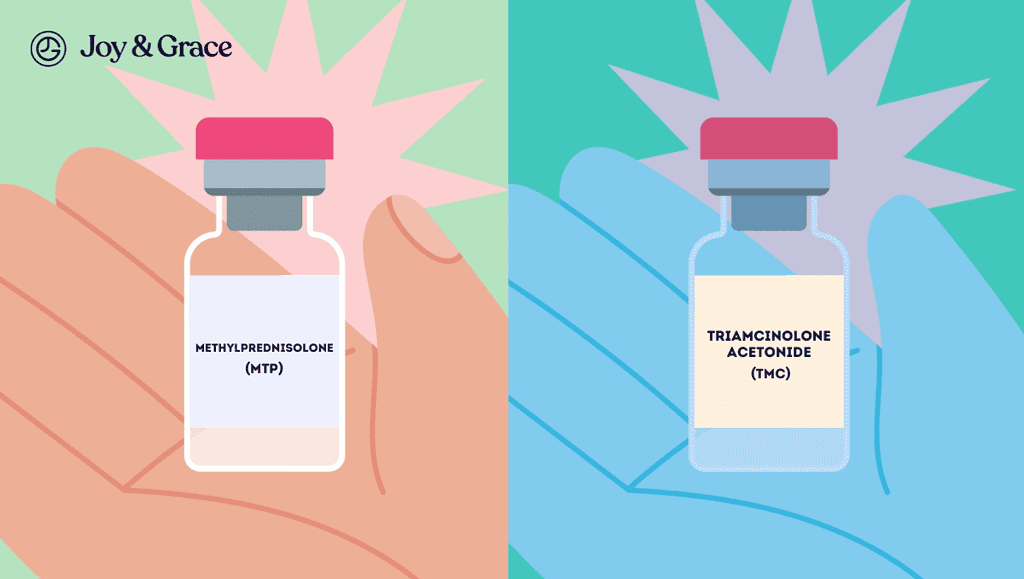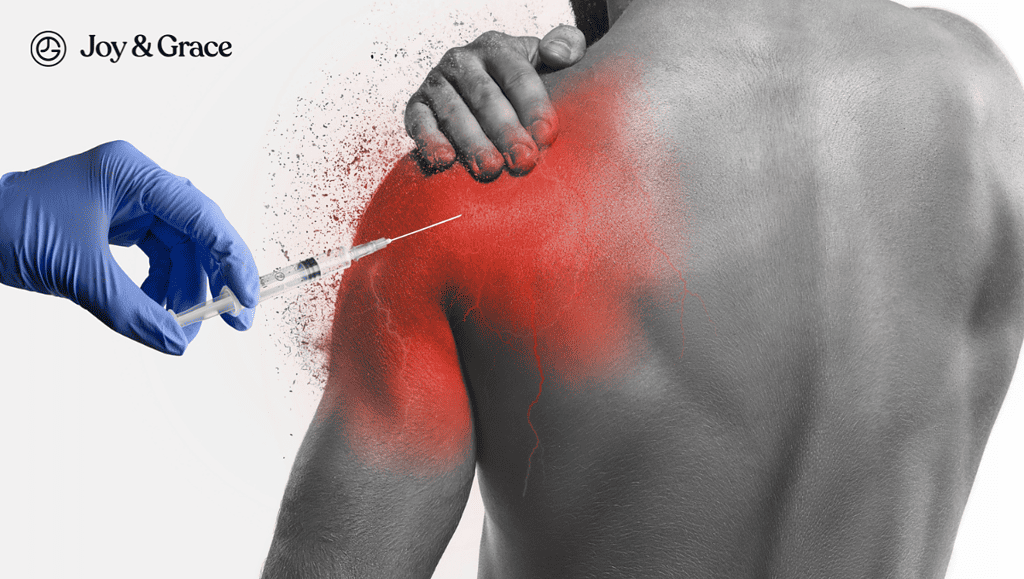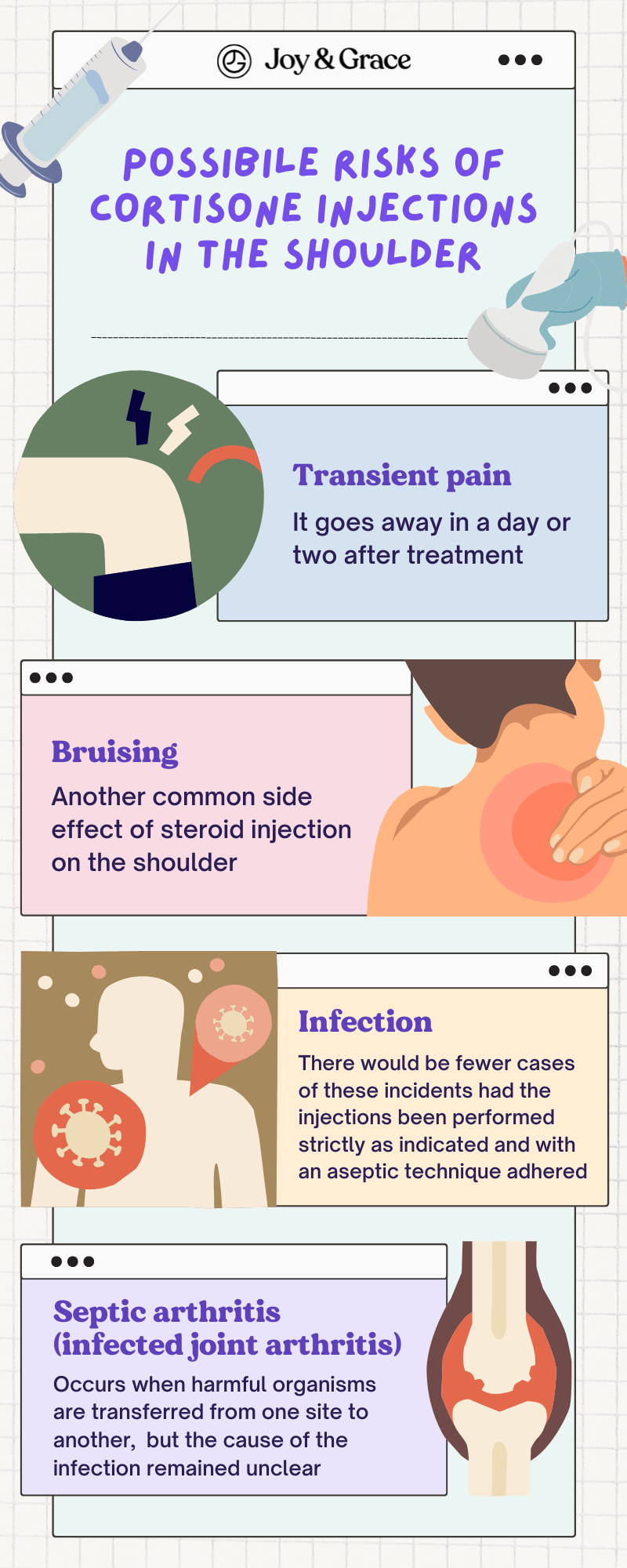Dealing with shoulder pain can be frustrating and downright debilitating. It's hard to carry out your daily activities when reaching for something can cause sharp pain. Luckily, cortisone injections can be an effective solution for treating your shoulder pain. Corticosteroids, or steroids, are often used to reduce inflammation and treat joint pain. This article aims to discuss the following:
- What conditions are treated with steroid injections
- Frequency of injections in a year
- Safety of steroid injections
- Other pertinent information
What Are Steroid Injections?

Steroid injections, also known as corticosteroid injections, are a medical treatment used to alleviate pain, reduce inflammation, and promote healing in various conditions. A steroid is a type of medicine that is anti-inflammatory (reduces swelling, pain, hotness, etc). In addition to injections, steroidal drugs also come in various other preparations, such as tablets or inhalers.
Steroid injections deliver a powerful anti-inflammatory medication directly into the affected area, aiming to reduce pain, swelling, and inflammation.
In this article, we'll talk about the research and evidence behind steroid injections for shoulder pain. We'll also talk about the possible benefits of these injections and some common safety concerns about them. To make smart decisions about your health and, ultimately, to deal with shoulder pain, you need to know how well steroid injections work.
What Conditions Are Treated With Cortisone Shot?

It’s important to note that cortisone shots for shoulder pain reduce inflammation and relieve pain, but they are not a cure. Hence, they’re not usually used to “treat” conditions. They rather open the way for physical therapy and other treatments to improve mobility and address the underlying condition.
That said, shoulder pain is one of the many disorders that can be handled with cortisone shots. In addition to shoulder pain, cortisone injections can also be used for other conditions. Common conditions that may be treated with cortisone shots include:
- Bursitis: It is a condition that occurs when the bursae, tiny sacs that cushion joints, become inflamed. This can cause pain and stiffness in the affected joint, including the shoulder.
- Tendonitis: It occurs when a tendon swells or becomes inflamed. This can cause pain and limited mobility in the affected joint, including the shoulder.
- Frozen shoulder: This condition is medically known as adhesive capsulitis. It involves pain and stiffness of the shoulder, which is perceived as ‘freezing.’
- Periarthritis of the shoulder. This kind of arthritis causes pain and stiffness in a single joint, particularly the shoulder.
- Autoimmune disorders: A plethora of disorders when the body’s immune system starts attacking your body.
- Carpal tunnel syndrome: Hand and wrist condition involving nerve compression that causes pain, tingling, and weakness in the hand and fingers.
- Plantar fasciitis: Inflammation of the plantar fascia, a tissue connecting the heel to the toes, resulting in heel pain, especially in the morning or after rest.
- Back pain (including sciatica): Discomfort or pain in the back, often accompanied by radiating leg pain (sciatica), caused by various factors such as muscle strains, herniated discs, or spinal conditions.
What is the Best Corticosteroid Injection?

Determining the best corticosteroid injection is difficult as it depends largely on the condition being treated. Regarding shoulder pain, cortisone injections are a highly effective option. According to a study, the success rate of this injection is at 90%. But with so many corticosteroids available, knowing which is best for your specific needs can be challenging. Here are the two main options:
- Methylprednisolone (MTP) is often used for shoulder pain caused by arthritis or bursitis. In 2008, a study was conducted to compare the efficacy of MTP and triamcinolone (TMC) in treating painful shoulder conditions. The outcomes (range of motion and pain levels) were measured at different intervals post-injection. At two months post-injection, 50% of the MTP group (compared to 25% of the TMC group) showed total pain relief. Hence, pain relief was observed more rapidly in MTP than with TMC.
- Triamcinolone (TMC) acetonide is commonly used for frozen shoulder pain. Additionally, it’s also used to relieve post-surgery pain. For instance, a 2023 study found that injection of TMC after surgery significantly improved joint movement compared to surgery alone.
The best corticosteroid injection for you will depend on the severity of your disease, where your symptoms come from, and how much pain you are in. To choose the best course of therapy for you, it's crucial to consult with your doctor frequently. It would help if you also review any possible risks or side effects of cortisone injections.
Is Cortisone Injection Good for Frozen Shoulders?

Yes, as established earlier, cortisone injections (particularly triamcinolone) are good for frozen shoulder. Finding the right dose is important too. In a study of 57 subjects, results showed that a dose of 40mg TMC significantly improved symptoms of frozen shoulder more than those receiving a lower dose.
Furthermore, symptoms assessed include improvement in the following:
- Pain
- Sleep disturbance
- Functional impairment
- Passive range of motion (the shoulder joint movement with assistance).
When injected directly into the affected area, cortisone can relieve pain and swelling quickly. However, it is essential to note that it only provides temporary relief and does not heal the underlying cause of the pain. Since cortisone injections reduce discomfort and inflammation, patients with a frozen shoulder may move the joint to further improve the range of motion.
How Many Times a Year Can You Get a Cortisone Shot in Your Shoulder?
In general, you should have at most three cortisone shots in a year.
Most people don’t need that many shots, however. In several trials, only a single shot was needed to notice an improvement in symptoms. This may only be applicable if you have an acute condition (an ailment that needs immediate medical injection). It may be different if you are suffering from the condition chronically.
It is important that you discuss your options with your medical provider. They are more informed about how many injections you can actually receive in a year.
Are Cortisone Injections in the Shoulder Safe?
Yes, cortisone injections in the shoulder are generally considered safe.

According to a 2008 study, steroid injections are better tolerated and more effective for short-term pain relief than the results obtained from the combination of different types of treatments. Nonetheless, you need to know that, like other medical treatments, it comes with the possibility of risk, such as:
- Transient pain. A study reported that 10.7% of participants had transient pain following the injection. Being transient means it goes away in a day or two after treatment.
- Bruising. This is another common side effect of steroid injection on the shoulder.
Other serious side effects that can be prevented include the following:
- Infection. According to a study, infections are a fairly common side effect after local injection of steroids. In the same study, however, it states that there would be fewer cases of these incidents had the injections been performed strictly as indicated and with an aseptic technique adhered to.
- Septic arthritis (infected joint arthritis). It is a rare but severe complication that may result from any therapeutic procedure. It occurs when harmful organisms are transferred from one site to another. In one case study, a 36-year-old patient developed infected arthritis after the second steroid injection. However, the cause of the infection remained unclear.
Steroid use for shoulder discomfort may also result in other rare effects, such as acne, mood swings, weight gain, and sleep issues. These side effects depend on dosage, administration method, and individual reactions.
If you have questions about this treatment, you should talk to your healthcare provider about them.
Other Pertinent Questions
Can I Move My Shoulder After a Cortisone Shot?
Yes, you can move your shoulder after a cortisone shot.
Following the injection, you may feel sore or in pain, but you should usually have little trouble moving your shoulder. Moving your shoulder often after the shot is important to keep it from getting stiff and to help it heal. In fact, a study states that corticosteroid shots in combination with physical therapy result in reduced shoulder pain.
However, it's important to note that everyone's experience may vary. Speaking with your doctor if you're in much pain or discomfort is crucial. In addition, always heed the advice of your healthcare practitioner and express any concerns you may have.
Can I Walk After Cortisone Injection in My Shoulder?
Generally, it is safe to walk after cortisone injections in the shoulder. However, your healthcare provider may recommend that you avoid overly strenuous activities. Refrain from doing things that overexert your shoulder or activities that may cause pain and strain your shoulder further.
It's normal to experience some discomfort and swelling after a cortisone injection, so take it easy for the first few days. After that, you can gradually increase your activity level as tolerated.
Talk to your doctor if you have concerns about your activity level after a cortisone injection. They can provide specific guidelines based on your individual needs and the severity of your shoulder pain. Ultimately, the goal is to balance rest and movement to promote healing and recovery.
Takeaway
Since cortisone injections are good at reducing pain and inflammation, they are often used to treat stiff shoulders. By putting corticosteroids directly on the painful area, they can provide immediate relief and care for the long term.
Contrary to popular opinion, cortisone injections do not treat the root causes of pain and are not a long-term fix. This must be made clear. Talk to your doctor about this course of therapy to determine if it's right for you, as cortisone injections may also have adverse side effects.















